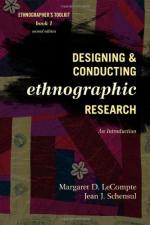|
This section contains 2,779 words (approx. 10 pages at 300 words per page) |

|
Ethnographic research (also referred to as field research or participant observation) is a qualitative social science method that involves the observation of the interactions of everyday life, whether in public parks, business organizations, or mental health clinics. It is social constructionist, exploring intersubjective cultural meanings rather than positivist "social facts," or laws. The theoretical intent of ethnography is inductive, generating concepts and theories from the data. However, in sociology, ethnography is also associated with micro-level theories such as symbolic interactionism, ethno-methodology, labeling theory, and dramaturgy. In particular, the theories of everyday life developed by Georg Simmel (1950) and Erving Goffman (1959) form part of the disciplinary repertoire from which workers in the field draw their concepts. Some field researchers also link their ethnography to critical, macro-theoretical frameworks emphasizing power relations within hierarchies of gender, class, race, age, nationality, or sexual orientation (Diamond, 1993).
The goal of field research is on the...
|
This section contains 2,779 words (approx. 10 pages at 300 words per page) |

|


